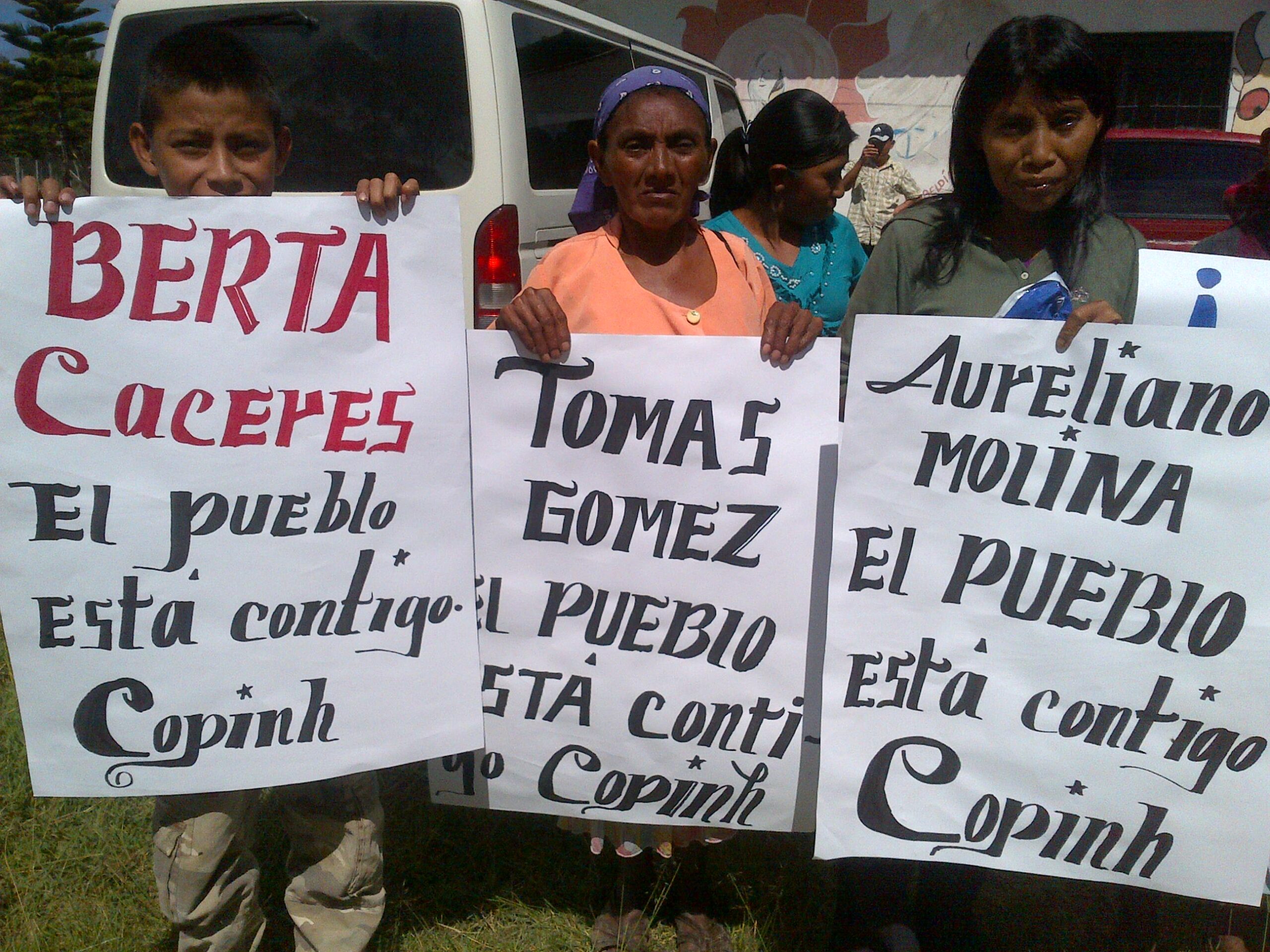“We respectfully ask the State of Honduras to publically recognize the vital work of human rights defenders in the country and put an end to practices of intimidation,” appealed JASS Mesoamerica’s Daysi Flores as she shared a public statement from the National Network of Women Human Rights Defenders of Honduras outside a small courthouse in the department of Intibucá, approximately 107 kilometers outside of Tegucigalpa, Honduras. She was joined by nearly 500 men, women, and children who stood before the courthouse awaiting updates on the ongoing trial of Berta Caceres, Tomas Gómez Membreño and Aureliano Molina, leaders of the indigenous Lenca organization Council of Popular and Indigenous Organizations of Honduras (COPINH). The repression they face is a product of a corrupted police, army and judicial system in cahoots with local elites and organized crime where the “get-tough on crime” mandates provide a pretext to treat social justice activists like criminals.
Mirroring similar struggles in Guatemala and Mexico, the indigenous Lenca community is fighting for the removal of a hydroelectric power project from their land, asserting that the Honduran government failed to consult the Lenca community before granting permits to hydroelectric company, Desarrollos Energeticos S.A (DESA), violating the constitutional “right to consultation” as mandated by provision 169 of the ILO Convention. As the community continues to protest, federal military forces have been sent in to “protect” the hydroelectric plant, continuing the regional pattern of police and military used to protect private interests.
The government’s goal is to decapitate the movement, putting Lenca leaders in jail so that the corporations can continue their extractions unimpeded,” writes Beverly Bell, Other Worlds.
Activists like Berta, Tomas, and Aureliano are being targeted for their leadership in organizing the Lenca people to demand a say—their right by law—in the development and use of their land. Besides the two charges, Berta was facing an additional charge of illegal possession of a weapon “in contravention to the internal security.” On September 20, 2013 the presiding judge handed down a court order, calling for Berta to serve “preventative prison,” issuing an arrest warrant within hours; Tomas and Aureliano were given a form of house arrest status. The COPINH leaders will now face further persecution as the $44 million trial against them goes forward, led by the DESA Corporation and the Honduras Public Ministry.
Networks & Solidarity for Protection
In this context, at-risk frontline women activists from various movements are relying on national groups and a regional network of women human rights defenders (WHRD) for alliance-building, protection, and resources to navigate risks and escape life-threatening situations. As a co-coordinator of such groups in Honduras and Mexico, JASS Mesoamerica accompanies and supports women defenders like Berta Caceres through dangerous situations that result from their human rights work. Likewise, through these networks JASS Mesoamerica fosters communication and solidarity among activists within countries, across borders, and internationally to strengthen their demand for justice and more sustainable development models.
JASS’ strong roots in local and national organizing, and its community of global activists helped mobilize support from over 150 international and Latin American organizations, such as Other Worlds, Grassroots International, and Rights Action which have joined forces to give global attention and support to COPINH. Together, we issued a public statement (Spanish) condemning the continuous persecution of COPINH, held press conferences and placed ads in one of the biggest newspapers in Honduras, La Tribuna as well as raised money for legal fees. JASS and the National WHRD Network are continuing to accompany Berta.
Thank you for the gestures of national and international solidarity, of the determined mobilization of COPINH, of sister organizations and progressive social and political forces that have added their weight to the struggle of COPINH. We condemn the decision of the Court, of Judge Lissien Lisseth Knight Reyes who followed the order of the DESA Corporation, knowing she was pressured to do so from above, that DESA controlled this resolution. This is the “justice” we have in Honduras.” Berta Caceres
Gender Analysis of Violence
The national and regional networks of Women Human Rights Defenders (WHRD) presents much-needed opportunities for women activists and human rights defenders from various movements to share challenges and distill lessons learned from their activism, especially as perpetrators and forms of violence become increasingly more complex. The networks also provide women activists with a support system for confronting the risks they face as women and activists
“We have to recognize that we’re targets. Too many of us have been murdered, simply for exercising the right to defend rights,” said Morena Herrrera (La Colectiva Feminista) during a 3-day regional meeting of 187 women defenders from more than 9 countries across the Americas and Europe. JASS Mesoamerica’s team co-led this Second Annual Gathering of WHRD in El Salvador so women activists could share experiences and methods for ensuring their own safety and psychological well-being, as well as develop more effective urgent action and advocacy strategies from a feminist human rights perspective.
“We demand that protection mechanisms for women defenders be implemented and an end to impunity.” Marusia López Cruz, during the Sept. 9, 2013 press conference
With the help of the national networks in El Salvador, Guatemala, Mexico and Honduras, the Mesoamerican Women Human Rights Initiative (IMD) has been systematically collecting data on attacks and threats against women activists through the Regional Registry of Violence against WHRD since early 2012. Based on the data and building on the 2010/2011 report, the IMD recently released the 2012 assessment report Violence against WHRD in Mesoamerica in Spanish during a press conference in San Salvador. The report documents the 414 attacks against women defenders that were registered during 2012 in Mexico, Guatemala, Honduras, and El Salvador. It also indicates that state actors were responsible for 87% of the attacks and that 98% of these registered attacks have gone unpunished.


























